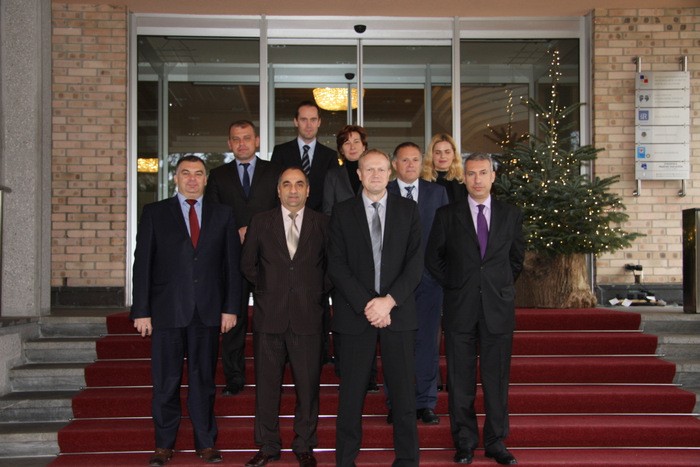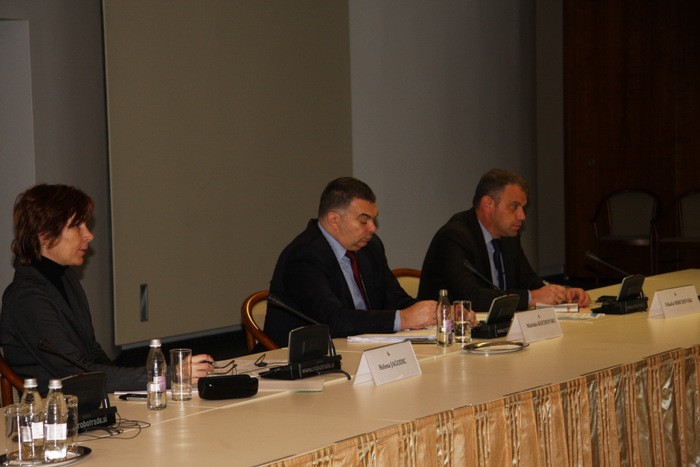The police chiefs gathered at Brdo pri Kranju on 4 December 2015 at the invitation of Marjan Fank, Director General of the Slovenian Police, to discuss stepping up control at the borders in light of the increased migration flow felt by the four countries.

In recent years, Europe has been facing an unprecedented influx of migrants. Just this year, a staggering 1.2 million migrants have entered into the European Union, mostly using the two main migration routes. It is not very likely that in the long run this influx will subside despite all the efforts. A peculiarity of the current migration influx is that all migrants have a clear destination in mind and it is not our countries. Therefore, the role of the countries migrants transit through is to provide the basic humanitarian and medical care, to maintain law and order and to register migrants travelling through. This is supported by virtually negligible numbers of lodged international protection applications.
As some countries of destination are severely overstretched, they have started adopted measures to stem the arrival of migrants. For this reason, the countries along the migration route were forced to adopt some additional measures, which do not signify the closing of borders but were taken to enable and strengthen the provision of safety to migrants and prevent a deterioration of the humanitarian situation. In recent days we have witnessed a decrease in the number of arrivals, which is a result of the weather conditions in Greece as well as tightened reception measures at the Macedonian border. However, this is not a long-term guarantee for reduced numbers.

In the next few months it will become clear how much of a long-term impact will the EU - Turkey agreement on the joint action plan for migration management cooperation have.
The Paris attacks highlighted another very important aspect, i.e. security. Everybody's attention got quickly redirected from previously mostly the humanitarian aspect and thus there is added pressure on the work of the police in controlling and balancing the migration flow through our countries.
At today's meeting, representatives of the Slovenian, Serbian, Macedonian and Greek police have pledged to engage in efforts for better identification of migrants. One of the possibilities discussed was to introduce a document to accompany a migrant throughout their journey from their first entering Europe. Slovenia will try to gain a broader consensus on this idea within the EU, and if it comes to its implementation, Frontex will also have to take part.

Police representatives underlined the importance of communicating accurate data on migrants and capacities as was agreed at the meeting of prime ministers on 25 October 2015 and as carried out under the auspices of Frontex.
Due to a constant increase in the number of migrants who do not need international protection, discussions on limiting migration and closing the border to those migrants not seeking international protection are gaining ground. Representatives of all four police forces were in agreement that rules need to be consistently observed and mutual cooperation stepped up so that persons who need international protection can be effectively identified.
With such a massive influx of migrants, all police forces encounter cases when individuals or parts of families get separated from the rest of the family. From now on, contact points designated by the participating police forces will help the Red Cross in family reunification efforts.

There are an increasing number of persons among the migrants who are thinking of returning home or to another country where they were adequately accommodated but they lack funds and information on how to do that. All the countries in the region have certain forms of cooperation with the International Organisation for Migration (IOM), which has a mandate for supporting voluntary return. Police representatives decided to jointly call on the IOM to prepare a proactive regional approach for the promotion and support of voluntary return.
In the discussions all the participants expressed great expectations as regards the positive impact of the additional activities to be carried out by Frontex in Greece, which are to being shortly. Yesterday Greece requested Frontex and member states for assistance in stepping up control over migration flows coming to its islands, through the RABIT mechanism. A joint operation at the border with Macedonia is to start soon and will be aimed at enhancing control of migrants exiting Greece and setting off on the Balkan route.
Croatia, though invited to the meeting, did not attend; therefore, Director General of the Police Marjan Fank will inform his Croatian counterpart of the conclusions of the meeting.
Police Activities in Connection with Current Migration Flows

